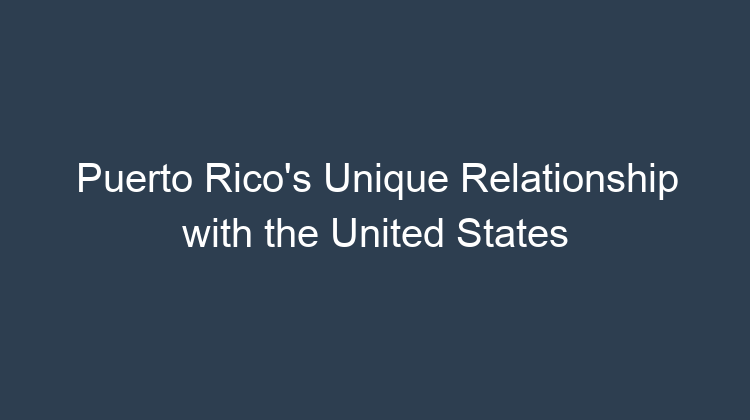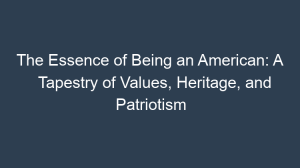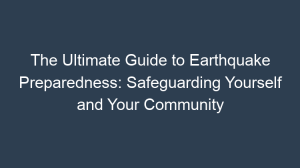Puerto Rico’s political status has been a topic of debate for many years, with various proposals ranging from statehood to independence. The island’s relationship with the United States is complex and has evolved over time, influenced by historical, political, and economic factors.
Puerto Rico’s relationship with the United States dates back to the Spanish-American War of 1898. After the war, Puerto Rico became a U.S. territory, and its inhabitants were granted U.S. citizenship in 1917. However, Puerto Ricans were not allowed to vote in presidential elections or send representatives to Congress.
In 1952, Puerto Ricans approved a new constitution that established the Commonwealth of Puerto Rico, a self-governing entity in association with the United States. This status gave Puerto Ricans more autonomy, but they still did not have the same rights as U.S. citizens living in the states.
H2: Historical Context
Puerto Rico’s Colonial Past
Puerto Rico has a rich and complex history that has shaped its current relationship with the United States. The island was first colonized by Spain in the 15th century and remained under Spanish rule for over 400 years. During this time, Puerto Rico was heavily influenced by Spanish culture and language.
The Spanish-American War and U.S. Acquisition
In 1898, the United States and Spain went to war over Cuba. As part of the peace treaty that ended the war, Spain ceded Puerto Rico to the United States. This marked a significant turning point in Puerto Rico’s history, as the island became a U.S. territory.
The Road to Commonwealth Status
In the early 20th century, Puerto Ricans began to push for greater autonomy from the United States. In 1952, they approved a new constitution that established the Commonwealth of Puerto Rico, a self-governing entity in association with the United States. This status gave Puerto Ricans more control over their own affairs, but they still did not have the same rights as U.S. citizens living in the states.
H2: Political Status
U.S. Citizenship and Voting Rights
Puerto Ricans are U.S. citizens by birth, but they cannot vote in presidential elections or send representatives to Congress. This is because Puerto Rico is not a state, but a U.S. territory. As a result, Puerto Ricans have less political power than U.S. citizens living in the states.
Statehood, Independence, or Commonwealth
There are three main options for Puerto Rico’s future political status: statehood, independence, or commonwealth. Statehood would make Puerto Rico the 51st state, giving its residents the same rights and responsibilities as U.S. citizens living in the states. Independence would make Puerto Rico a sovereign nation, free from U.S. control.
The Current Debate
The debate over Puerto Rico’s political status is ongoing. Supporters of statehood argue that it would give Puerto Ricans full equality as U.S. citizens. Supporters of independence argue that it would allow Puerto Ricans to control their own destiny. Supporters of commonwealth argue that it is the best way to preserve Puerto Rico’s unique culture and identity.
H2: Economic Relationship
Trade and Commerce
Puerto Rico’s economy is closely tied to that of the United States. The island is heavily dependent on imports from the mainland, and it exports a variety of goods to the United States, including pharmaceuticals, electronics, and agricultural products.
Investment and Development
The United States has invested heavily in Puerto Rico’s economy. This investment has helped to create jobs and boost economic growth. However, Puerto Rico’s economy has also been hurt by the decline of the manufacturing sector and the global recession.
Challenges and Opportunities
Puerto Rico faces a number of economic challenges, including a high unemployment rate, a large trade deficit, and a heavy debt burden. However, the island also has a number of economic opportunities, including a skilled workforce, a strategic location, and a growing tourism industry.
H2: Social and Cultural Ties
Language and Culture
Puerto Rico’s culture is a unique blend of Spanish, African, and American influences. The island’s official languages are Spanish and English, and many Puerto Ricans are bilingual. Puerto Rican culture is also reflected in the island’s music, dance, food, and art.
Family and Community
Family and community are very important in Puerto Rican culture. Puerto Ricans are known for their strong sense of family loyalty and their close-knit communities. This is reflected in the island’s high rate of church attendance and the importance of extended family networks.
Education and Healthcare
Puerto Rico’s education and healthcare systems are heavily influenced by the United States. The island’s public schools follow the U.S. curriculum, and many Puerto Ricans attend U.S. colleges and universities. Puerto Rico’s healthcare system is also similar to that of the United States, with a mix of public and private providers.
H2: Environmental Issues
Climate Change and Natural Disasters
Puerto Rico is particularly vulnerable to the effects of climate change, including rising sea levels, more frequent and intense hurricanes, and changes in precipitation patterns. These changes are already having a negative impact on the island’s environment, economy, and infrastructure.
Pollution and Waste Management
Puerto Rico also faces challenges related to pollution and waste management. The island’s air and water quality have been compromised by industrial pollution and improper waste disposal. This has led to health problems for residents and damage to the island’s ecosystems.
Conservation and Sustainability
Puerto Rico is taking steps to address its environmental challenges. The island has set ambitious goals for reducing greenhouse gas emissions and increasing renewable energy production. Puerto Rico is also working to improve its waste management practices and protect its natural resources.
H2: FAQ
What are the main options for Puerto Rico’s political status?
There are three main options for Puerto Rico’s political status: statehood, independence, or commonwealth.
How is Puerto Rico’s economy related to that of the United States?
Puerto Rico’s economy is closely tied to that of the United States. The island is heavily dependent on imports from the mainland, and it exports a variety of goods to the United States, including pharmaceuticals, electronics, and agricultural products.
What are some of the social and cultural ties between Puerto Rico and the United States?
Puerto Rico’s culture is a unique blend of Spanish, African, and American influences. The island’s official languages are Spanish and English, and many Puerto Ricans are bilingual. Puerto Rican culture is also reflected in the island’s music, dance, food, and art.
What are some of the environmental challenges facing Puerto Rico?
Puerto Rico is particularly vulnerable to the effects of climate change, including rising sea levels, more frequent and intense hurricanes, and changes in precipitation patterns. These changes are already having a negative impact on the island’s environment, economy, and infrastructure.
What is the current state of the debate over Puerto Rico’s political status?
The debate over Puerto Rico’s political status is ongoing. Supporters of statehood argue that it would give Puerto Ricans full equality as U.S. citizens. Supporters of independence argue that it would allow Puerto Ricans to control their own destiny. Supporters of commonwealth argue that it is the best way to preserve Puerto Rico’s unique culture and identity.
H2: Conclusion
The relationship between Puerto Rico and the United States is complex and has evolved over time. The island’s history, political status, economic ties, social and cultural connections, and environmental challenges are all factors that shape this unique relationship. As Puerto Rico continues to seek its own identity, the debate over its political status is likely to continue.







